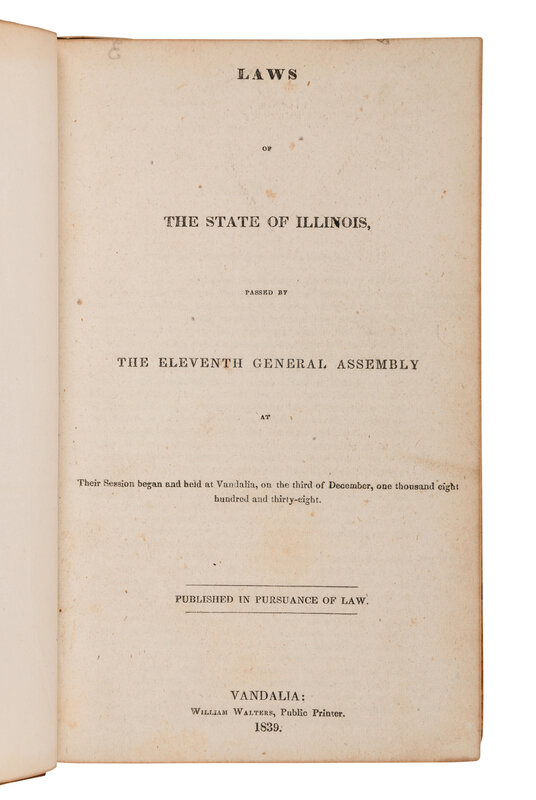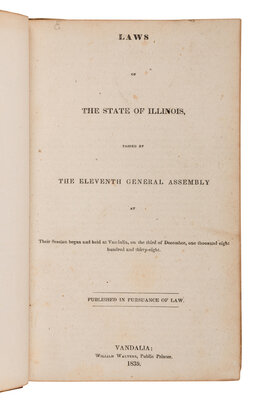[MORMONISM]. Laws of the State of Illinois, Passed by the Twelfth General Assembly... 1841. FIRST EDITION, discusses incorporation of Nauvoo as a city.
Sale 1336 - Fine Books and Manuscripts, including Worlds of Tomorrow, and Americana
Jun 7, 2024
9:00AM CT
Live / Chicago
Own a similar item?
Estimate
$1,000 -
1,500
Price Realized
$3,493
Sold prices are inclusive of Buyer’s Premium
Lot Description
[MORMONISM]. Laws of the State of Illinois, Passed by the Twelfth General Assembly, at Their Session, begun and held at Springfield, on the seventh of December, one thousand eight hundred and forty. Springfield: Wm. Walters, 1841.
8vo (210 x 130 mm). (Hinges starting.) Contemporary sheep (extremities a bit worn with chipping and losses to compartments). Provenance: Mark Bangs (neatly penciled ownership signature); Gibbons (inked signature).
FIRST EDITION. During the 1840-1841 session of the Illinois General Assembly, laws were passed incorporating Nauvoo as a city (pp.52-57), incorporating the Nauvoo House Association (pp.131-132), incorporating the Nauvoo Agricultural and Manufacturing Association (pp.139-145), and appointing a Notary Public to Nauvoo (p.190). In addition to the significant features of the city’s corporate powers, elections, court system, and the right to establish a university system, the “Act to Incorporate the City of Nauvoo” includes an unusual provision allowing for the organization of a militia: “The city council may organize the inhabitants of said city subject to military duty into a body of independent military men, to be called the ‘Nauvoo Legion,’ the court martial of which shall be composed of the commissioned officers of said legion…with full powers and authority to make, ordain, establish and execute all such laws and ordinances… Said legion shall be exempt from all other military duty” (p.57). Additionally, an important attachment to the Road Act provided that “any citizen of Hancock county, may, by voluntary enrollment, attach himself to the Nauvoo Legion, with all the privileges which appertain to that independent military body” (p.223). Throughout, important principals are named, including Joseph Smith, Hyrum Smith, Orson Pratt, Sidney Rigdon, George Miller, Lyman Wright, John Snyder, and Peter Hawes.
Condition Report
Auction Specialist

